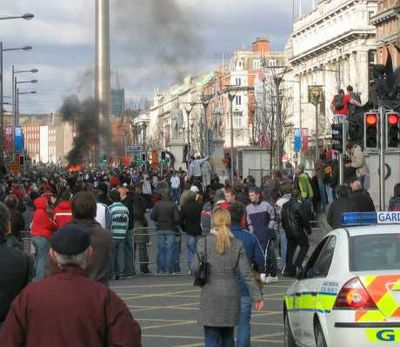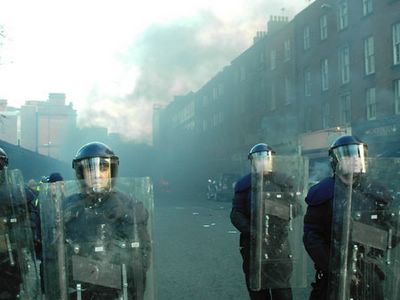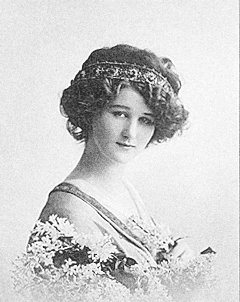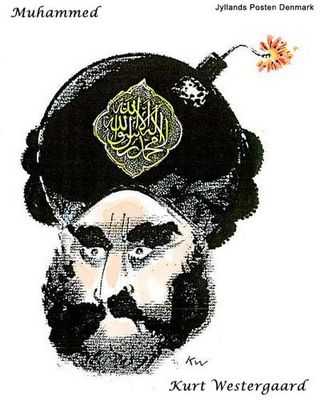
Last September a Danish newspaper, Jyllands Posten, commissioned and published a series of twelve cartoons depicting various artists' perceptions of Muhammed (and by extension, Islam). That was in the Year of Our Lord 2005 -- notice how even the numbering of years carries a religious significance!! -- and now the editors at Jyllands Posten are starting to wish they hadn't. Not only the newspaper but the whole country of Denmark has become the target of a veritable firestorm of Islamic outrage. Ambassadors have been recalled, trade boycotts have been initiated, and threats of violence have come pouring in.
Two questions. First, why did it take three and a half months for the Islamic world to work itself into its present state of frenzy? Second, what did the editors of the newspaper -- and for that matter, the cartoonists themselves -- expect, given the history of Islamic sensitivity to any real or implied criticism of their religion? Have we so soon forgotten the fatwa on Salman Rushdie, or the assassination of Theo van Gogh in Amsterdam?
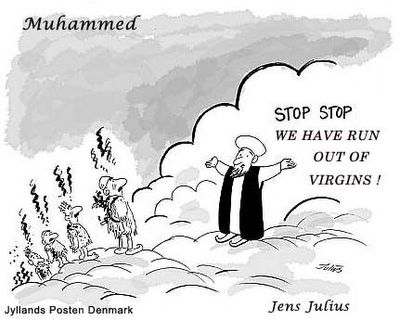
The general European reaction across a wide spectrum of government and social opinion has been to deplore the possibility of having truly offended against Islam while stoutly defending the right of freedom of expression as a bulwark of open and free societies. I tend towards the latter view myself (what do you think a Blog is for??) but not to the point where such freedom implies the right to incite hatred or violence towards other groups or individuals. It is interesting in the context of the present virulent attacks on Denmark and the Danish government to note that the same government stepped in quite recently to shut down an anti-Islamic publication on the grounds of incitement. But all that is forgotten in the present excitement.

Is there an anti-Islamic backlash taking root in Europe? It wouldn't altogether surprise me, given the increasing pressures surrounding unintegrated immigration and the intolerable intolerance (to coin a phrase) of Islamic fundamentalists with their openly expressed contempt for Western-style democracy. These chaps don't have to like us or accept our views. We can live with that - well, most Europeans certainly could; I wouldn't be too sure about some of our American cousins, though, wrestling with their own fundamentalist/ideological demons: the 'Rapture' comes to mind, but then so do the neocons and the Project for the New American Century.
On the other hand, we don't have to like
them, either, nor do we have to accept their views and interpretations of the world we live in -- a world we have to share, by the way. Can they live with that? Apparently not. There seems to be more than a slight whiff of hypocrisy in the air ...
Here is an interesting Danish blog on the subject.
And in this
article Magdi Abelhadi discusses some of the issues which have given rise to the controversy.
And here comes today's coverage on
BBC NEWS:
Muhammad cartoon row intensifies Newspapers across Europe have reprinted caricatures of the Prophet Muhammad to show support for a Danish paper whose cartoons have sparked Muslim outrage.
Seven publications in France, Germany, the Netherlands, Italy and Spain all carried some of the drawings.
Their publication in Denmark led Arab nations to protest. Islamic tradition bans depictions of the Prophet.
The owner of one of the papers to reprint - France Soir - has now sacked its managing editor over the matter.
The cartoons have sparked diplomatic sanctions and death threats in some Arab nations, while media watchdogs have defended publication of the images in the name of press freedom.
Reporters Without Borders said the reaction in the Arab world "betrays a lack of understanding" of press freedom as "an essential accomplishment of democracy."
'Spiting Muslims' France Soir and Germany's Die Welt were among the leading papers to reprint the cartoons, which first appeared in Denmark last September.
The caricatures include drawings of Muhammad wearing a headdress shaped like a bomb, while another shows him saying that paradise was running short of virgins for suicide bombers.
France Soir originally said it had published the images in full to show "religious dogma" had no place in a secular society.
------------------------------------------------
CARTOON ROW 30 Sept: Danish paper Jyllands-Posten publishes cartoons
20 Oct: Muslim ambassadors in Denmark complain to Danish PM
10 Jan: Norwegian publication reprints cartoons
26 Jan: Saudi Arabia recalls its ambassador
30 Jan: Gunmen raid EU's Gaza office
31 Jan: Danish paper apologises
1 Feb: Papers in France, Germany, Italy and Spain reprint cartoons
------------------------------------------------
But late on Wednesday its owner, Raymond Lakah, said he had removed managing editor Jacques Lefranc "as a powerful sign of respect for the intimate beliefs and convictions of every individual".
Mr Lakah said: "We express our regrets to the Muslim community and all people who were shocked by the publication."
The president of the French Council of the Muslim Faith (CFCM), Dalil Boubakeur, had described France Soir's publication as an act of "real provocation towards the millions of Muslims living in France".
Other papers stood by their publication. In Berlin, Die Welt argued there was a right to blaspheme in the West, and asked whether Islam was capable of coping with satire.
"The protests from Muslims would be taken more seriously if they were less hypocritical," it wrote in an editorial.
La Stampa in Italy, El Periodico in Spain and Dutch paper Volkskrant also carried some of the drawings.
European Muslims spoke out against the pictures.
In Germany, the vice-chairman of the central council of Muslims said Muslims would be deeply offended.
"It was done not to defend freedom of the press, but to spite the Muslims," Mohammad Aman Hobohm said.
Sanctions Correspondents say the European papers' actions have widened a dispute which has grown very serious for Denmark.
--------------------------------------------------
ART AND BLASPHEMY CHARGES 1989: Iranian spiritual leader Ayatollah Khomeini calls on Muslims to kill British author Salman Rushdie for alleged blasphemy in his book The Satanic Verses
2002: Nigerian journalist Isioma Daniel's article about Prophet and Miss World contestants sparks deadly riots
2004: Dutch film maker Theo van Gogh killed after release of his documentary about violence against Muslim women
2005: London's Tate Britain museum cancels plans to display sculpture by John Latham for fear of offending Muslims after July bombings
--------------------------------------------------
The publication last September in Jyllands-Posten has provoked diplomatic sanctions and threats from Islamic militants across the Muslim world.
Foreign Minister Per Stig Moeller has postponed a trip to Africa because of the dispute.
Thousands of Palestinians protested against Denmark this week, and Arab ministers called on it to punish Jyllands-Posten.
Syria and Saudi Arabia have recalled their ambassadors to Denmark, while Libya said it was closing its embassy in Copenhagen and Iraq summoned the Danish envoy to condemn the cartoons.
The Danish-Swedish dairy giant Arla Foods says its sales in the Middle East have plummeted to zero as a result of the row, which sparked a boycott of Danish products across the region.
The offices of Jyllands-Posten had to be evacuated on Tuesday because of a bomb threat.
The paper had apologised a day earlier for causing offence to Muslims, although it maintained it was legal under Danish law to print them.
Danish Prime Minister Anders Fogh Rasmussen welcomed the paper's apology, but defended the freedom of the press.
